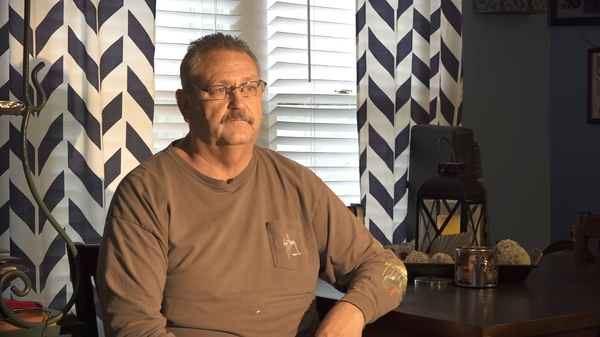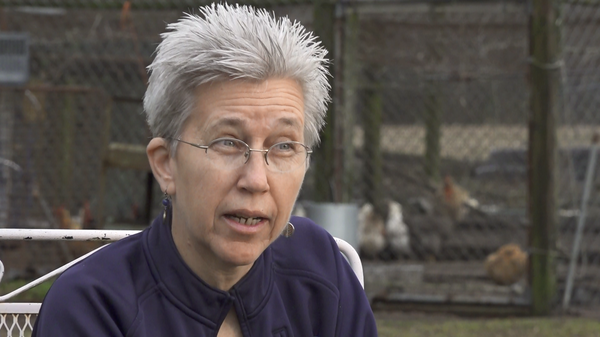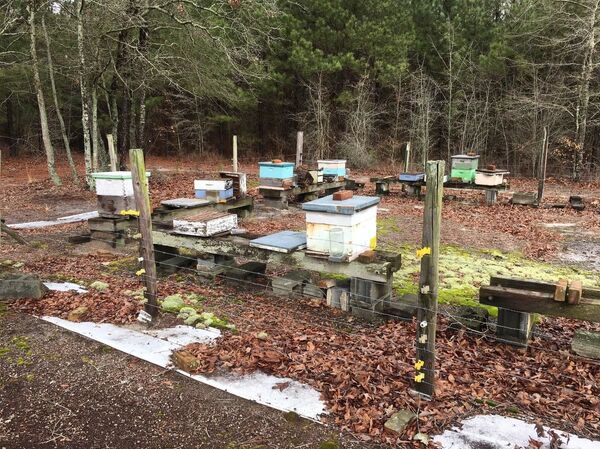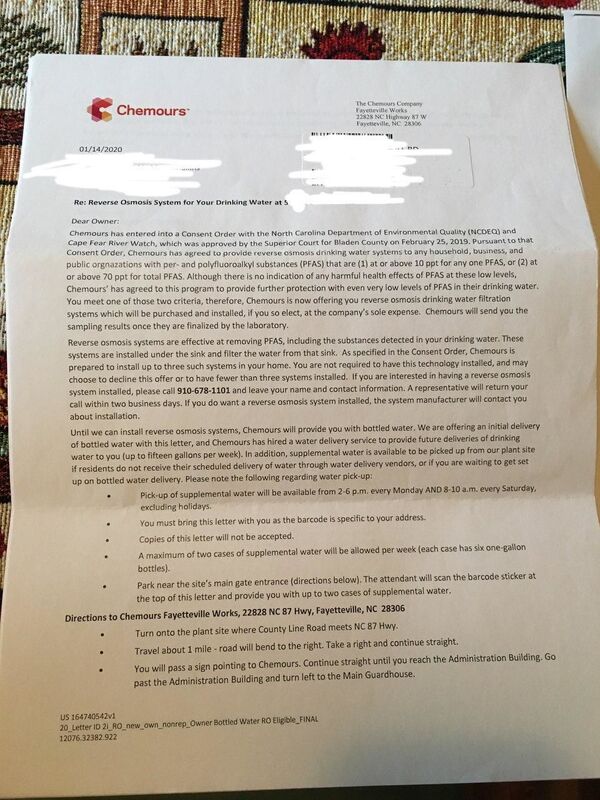A retired North Carolina engineer has his reasons to detest it. Manufacturing a signature non-stick coating involves per- and polyfluoroalkyl substances (PFAS) that - a necessary caveat - burn down during the process and do not make it into the final product.
"Forever chemicals," dubbed so for their longevity, have, however, for decades been leaking into the environment and are building up in human bodies. Studies link the pollution to heightened cancer risks among other health issues, making the related toxins among the worst produced, a claim never addressed by Teflon producers - DuPont and its spin-off Chemours.
Goins believes the PFAS exposure turned his well-deserved retirement in the city of Wilmington, NC into a torturous fight for survival.

"Here is somebody who had been healthy for 54 years, had been real healthy, had regular checkups - had been to the doctor with physicals every six months. And here all of a sudden you get hammered by all kinds [of cancer] - just bang, bang, bang," he says.
Bang, Bang, Bang
Goins was diagnosed with colon cancer along with a large tumor simultaneously discovered in his kidney.
"The colon cancer was stage three, almost stage four. And the kidney was stage three. And it was in the lymph nodes," he recollects. "They would give me some of the hardest chemo that you could take. And that stuff was horrible. All the skin on my hands and feet came off. That was raw, just raw meat. They had to hit me."
Goins’ prime suspect is a chemical plant in Fayetteville, a hundred miles away from Wilmington upstream on the Cape Fear River, which is used to provide tap water to neighbouring communities. The plant, inherited by Chemours from DuPont, has been blamed for alarming concentrations of PFAS substances in the river, including C8 and GenX.
The former was phased out by the chemical industry years ago after numerous lawsuits and a public outcry. The latter is viewed as C8's safer replacement, but animal tests have revealed similar health hazards, although this has been questioned by manufacturers.
"My exposure to it was very high. I drank a lot of water. And at that time I was too tight about bottled water. We drank about two gallons a day going fishing offshore. If I wasn’t drinking water I drank sweet tea, which is made with the water. Basically the same thing," Goins says. He had no cancer history in the family and tested negative for hereditary cancer markers.
"By knowing that and looking at my history it pretty much eliminated anything else," Goins says.
The US Environmental Protection Agency states that GenX chemicals are found in "surface water, groundwater, finished drinking water, rainwater, and air emissions in certain areas". Its animal studies have shown health effects in the kidney, blood, immune system, in developing fetuses, and especially in the liver following oral exposure.
"The data are suggestive of cancer," the EPA fact sheet says.
Chemours website makes no mention of GenX risks and argues that the data collected for over a decade demonstrate its safety "as a polymer processing aid for its intended use". The company cites a study by Dr. Damian Shea, Professor of Environmental Chemistry and Toxicology at North Carolina State University, who claims there is "compelling scientific evidence that the low levels of [GenX] detected in the environment do not pose a risk to human health."
Chemours did not respond to a request for comment.
After the disease struck him, Goins moved away from Cape Fear River and together with his wife and four dogs settled in a modest house with shaky floors and low ceilings deep inside the country. He still longs for the happy life they had in Wilmington in "the prettiest house around."
"I know it sounds kind of weird but I went through a period when I was almost scared of tap (water). That staff has hurt me so bad, physically, mentally. Physical is bad enough, but the mental stuff… What it does to your life, it takes your life," Goins says.

Toxic Normality
Brushing your teeth with bottled water, taking shorter and rarer showers, feeling nervous each time kids get caught in the rain. A daily routine can be very different if life is poisoned with a scare of a hazardous contamination.
Beth Kline-Markeskino, an environmental activist and marathon runner from Wilmington, has her own tragic story to tell. She lost an unborn child and links it to the tap water she drank in abundance, unaware of its PFAS pollution.
"Back in 2016, before I learned about our contamination, I was pregnant with my second child, my son. And we had no idea about our contamination. And as I'm a marathon runner and I drink loads and loads of water," she says. "During my pregnancy at about 24 weeks I felt a sharp pain in my stomach and I got rushed to the hospital. We ended up finding out that my son had not developed his kidneys, bladder or bowel. And my son ended up dying."
Though Kline-Markeskino admits that she cannot press charges with "110 percent" certainty, a recent study by Dr. Liping Feng from Duke University School of Medicine and Duke Global Health Institute traces a connection between pregnancy complications, including preeclampsia, and an exposure to newer PFAS substances, like GenX, which are generally considered less harmful than earlier versions.
"And also, you know, I have had my blood tested and I do have high levels of these contaminants in my blood," Kline-Markeskino says.
People in her neighbourhood use bottled water for drinking and hygiene, equip taps with advanced and costly reverse osmosis systems to filter out PFAS contaminants, give up gardening and take many other precautions.
"It really changes the way you live. You take your showers like every other day and you take shorter showers. Our kids used to jump in puddles. And now, since we've learned about Gen X, you don't want them to play out in the rain," Kline-Markeskino says. "I used to have beautiful gardens and now I don't want to grow my own fruit and vegetables. We are all very cautious in Wilmington."
Blue Honey
Some ten miles away from the Fayetteville plant, amid the North Carolina pine forest, Vicki Mullins runs a picturesque farm with age-old pecan trees, free-roaming hens and a flock of guinea birds scurrying erratically and loudly screaming each time they encounter anything unusual.

"Oh, no, our neighbours love them because they eat the bugs. Nobody complains because they are like ‘We don’t have no ticks’," she smiles.
Mullins lives in what she describes as "a household full of sick people" with her daughter and husband having a cancer history and her granddaughter treated for asthma. Her concerns mount as she sees a couple of chicken born handicapped - "with no feet"- and bees, celebrated for churning out the rarest "blue honey", die in hive after hive.
"Four or five years ago we had 99 hives, close to a hundred hives. Now we are probably down to eight or ten. We cannot build them up, we don’t know what is going on with them," she says.

Mullins can’t think of any other explanation, except for PFAS environmental pollution from the Chemours facility.
"I am scared even to sell my eggs, to give away honey. I am scared to death to do that because am I contaminating my neighbours, am I giving them a sickness that I don’t know about?" she says. "It’s scary. Because we just don’t know enough about this and I feel like there is a cover up going on."
Mullins is on a strict gluten-free diet and has been for years relying on food she grows herself.
"I grow my own food to put in a freezer so that I have stuff to eat. I know it’s gluten-free and fresh. We can’t even do that now," she says. "I can’t do a garden, I can’t do anything. Is Chemours going to save me because I am gluten-free? I don’t think so."
Under the consent order with the state authorities, Chemours supplies her household with bottled water - up to 15 gallons a week - and offers to install up to three reverse osmosis filters in her home. Vicky says it’s not nearly enough to cover her farm’s needs as she can’t rely on wells anymore.

"How am I supposed to water a garden? I water it and GenX goes into my food," she says. "Get us good water. We had good water until they doped. They contaminated us, we didn’t bother them. They contaminated our water. Everybody here had good water, not a problem, until all this. I think they need to be made accountable."
Her hives are encircled with an electrified fence to scare off local bears. Bears now seem to be the least threat to the bees and their blue honey.
"If the last hive dies there won’t be any civilisation. People go ‘What? How did you get that?’ Because those honey bees are what keeps everybody alive. They do the pollination. Without the honey bees you won’t have a civilisation," Mullins says.
Global Threat
Under the Consent order, criticised by many as insufficient and unrealistic, Chemours promised to reduce PFAS emissions by up to 99 percent and devise a plan to clean up the accumulated pollution but explicitly denied "any violation of any law, regulation or permit". To those who seek to sue the company, an Ohio lawyer, Robert Billot, advises to brace yourself for lengthy and costly litigation that will require a health study of thousands of people.
He knows it better than anyone else. It was Billot who spent 20 years building an identical case against DuPont for the use of C8 in West Virginia, bringing the issue of "forever chemicals" into the limelight, extracting multi-million-dollar compensations for his clients and finally making the company phase out the substance. The lawyer’s crusade is described in the movie "Dark Waters", the documentary "The Devil We Know" and his own book, "Exposure".
"And now as we see these newer chemicals like GenX coming out on the market they have been told once again 'You, the people, who are exposed, you have the burden to prove this is causing you harm.’ And that’s unfortunately a real problem with the way the legal system works here," Billot said in an interview with Russia’s Channel 1.
"If you have to perform community studies to show what chemicals like this can do to humans, those are long, expensive studies. It takes thousands and thousands of people and it takes years to do those kinds of studies. And unfortunately in the meantime people continue to be exposed, continue to get sick, and continue to die of diseases like cancer," he explains.
Billot now seeks to put an end to this practice by trying to turn a single case involving an Ohio firefighter into a universal claim on behalf of everyone in the United States with any kind of "forever chemicals" in their blood.
"I am seeking… to try to require independent scientists to study and tell us what these chemicals will actually do and have the companies be the ones who have to pay for that. Those of us who have been used as guinea pigs and been exposed shouldn’t have to be paying for that," the lawyer says.
In the US alone, a survey by the Environmental Working Group documented over seven hundred sites in 49 states, including military bases, airports, manufacturing plants and landfills. According to the study, more than 100 million Americans - over a third of the entire population - are exposed to PFAS-contaminated water.
"Really this is a global issue. Regardless of where these chemicals are made, they can get up in our environment and fall through the rain and that’s how we end up with PFAS being found in polar bears and Arctic ice. It’s really an international issue that requires international cooperation," Billot argues.
Suing companies and phasing out "forever chemicals" is already not enough, he added.
"All those products that we made for the last 50-60 years are still out there. They are sitting in the landfills, in the environment, in our homes, in things like stains-resistance carpeting, clothing, fast-food wrappers, food packaging. It goes well beyond just Teflon pans," the lawyer said "Hopefully the great scientific minds of the world will be able to focus on that and start trying to figure out how we get rid of that."


